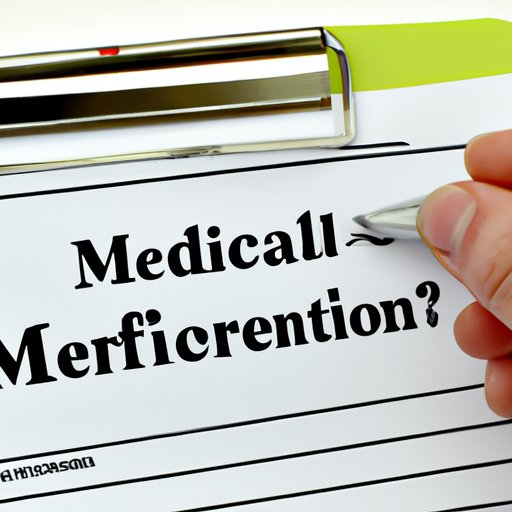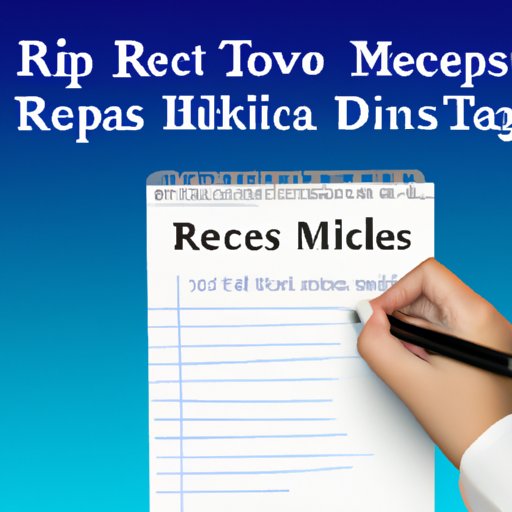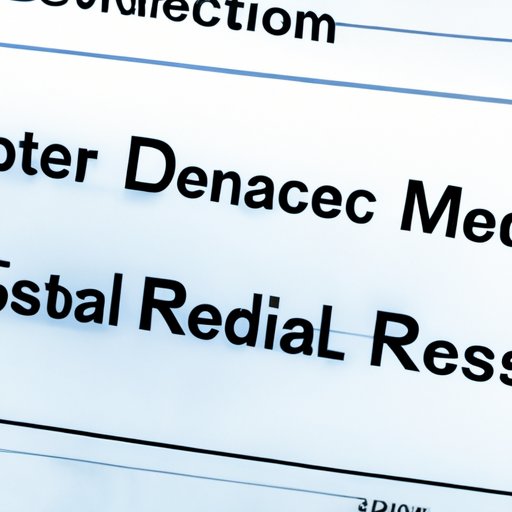Introduction
Medical records are important documents that contain a patient’s health information, including diagnosis, treatments, medications, and other vital information. It is important to be able to access these records when needed, and it is often necessary to do so in writing. This article will provide an overview of what information is necessary when requesting medical records in writing and the steps to take to ensure secure delivery.
Goals of the Article
The goal of this article is to provide readers with the essential steps, tips, and examples necessary for making a successful medical records request in writing. It will cover the necessary information and methods for ensuring proper delivery of the request, as well as the potential benefits and challenges associated with requesting medical records in writing.
Steps to Requesting Medical Records in Writing
When requesting medical records in writing, it is important to follow certain steps to ensure the request is sent properly and received by the correct party. The following steps should be taken when making a written request for medical records.
Identify the Proper Recipient of the Request
The first step in making a request for medical records in writing is to identify the correct recipient. Depending on the type of records being requested, this could be the doctor or facility that provided the care, the healthcare provider who owns the records, or a third-party organization responsible for storing the records. It is important to make sure the request is sent to the right person or organization, as the wrong recipient may not be able to fulfill the request.
Gather Necessary Information for the Request
Once the proper recipient has been identified, it is important to gather all the necessary information for the request. This includes the patient’s name, address, date of birth, type of records being requested, dates of records being requested, and the reason for the request. All of this information should be included in the written request for medical records.
Choose an Appropriate Delivery Method
When sending a written request for medical records, it is important to choose an appropriate delivery method. Options include fax, email, regular mail, and certified mail. Each option has its own advantages and disadvantages, so it is important to consider which one is best suited for the situation.
Consider Any Fees or Other Costs Associated with the Request
Many organizations charge fees for providing copies of medical records. These fees can vary depending on the type of records being requested and the method of delivery. Be sure to check with the recipient of the request to see if there are any associated costs before sending the written request.

What Information is Necessary When Requesting Medical Records in Writing
In order for a written request for medical records to be successful, it must include all the necessary information. This includes the patient’s name and address, date of birth, type of records being requested, dates of records being requested, and the reason for the request. All of this information should be clearly stated in the written request.

Ensuring Proper Delivery of Medical Records Requested in Writing
Once the written request for medical records has been sent, it is important to ensure the request is delivered properly. This can be done by following up with the recipient, using certified mail or other tracked delivery methods, and keeping copies of the request for your own records.
Follow Up With the Recipient
It is important to follow up with the recipient after sending the written request. This can be done either by phone or email. This will help ensure the request was received and that it is being processed correctly.
Use Certified Mail or Other Tracked Delivery Methods
Using certified mail or other tracked delivery methods will help ensure the request is received by the intended recipient. This is especially important if the request is being sent by regular mail, as there is no guarantee it will reach its destination without a tracking number.
Keep Copies of the Request for Your Own Records
It is important to keep copies of the written request for your own records. This will help if there are any issues with the request, such as it being lost in the mail or not being processed correctly.
Benefits of Requesting Medical Records in Writing
There are several benefits to requesting medical records in writing. This includes creating a legally binding document, making it easier to track the progress of the request, and providing a clear record of communication.
Legally Binding Document
A written request for medical records is a legally binding document. This means that the recipient is legally obligated to fulfill the request in accordance with applicable laws and regulations.
Easier to Track Progress of the Request
When a request for medical records is made in writing, it is easier to track the progress of the request. This can be done by following up with the recipient and using tracked delivery methods. This will help ensure the request is fulfilled in a timely manner.
Clear Record of Communication
Making a request for medical records in writing provides a clear record of communication between the recipient and the requester. This makes it easier to resolve any issues that may arise with the request.
Challenges of Requesting Medical Records in Writing
Although there are many benefits to requesting medical records in writing, there are also some challenges. These include long processing times, difficulty obtaining necessary information, and inaccurate or misplaced records.
Long Processing Times
One of the challenges of requesting medical records in writing is the long processing times. Depending on the size of the request and the organization fulfilling it, it can take weeks or even months for the request to be fulfilled.
Difficulty Obtaining Necessary Information
Another challenge of requesting medical records in writing is obtaining all the necessary information. This can be difficult if the patient is deceased or if the records have been misplaced. In these cases, it may be necessary to contact the doctor or facility that provided the care to get the information needed to make the request.
Inaccurate or Misplaced Records
Finally, requesting medical records in writing can be challenging if the records are inaccurate or misplaced. In these cases, it may be necessary to contact the doctor or facility that provided the care to get the correct information needed to make the request.

Tips for Making a Successful Medical Records Request in Writing
Making a successful request for medical records in writing requires careful attention to detail. The following tips can help ensure a successful request.
Be Clear and Concise
When making a request for medical records in writing, it is important to be clear and concise. All the necessary information should be included in the request and any additional information should be kept to a minimum.
Include All Necessary Information
All the necessary information should be included in the request, such as the patient’s name and address, date of birth, type of records being requested, dates of records being requested, and the reason for the request. This will help ensure the request is fulfilled quickly and accurately.
Follow Up After Making the Request
Following up after making the written request is important to ensure the request is received and being processed correctly. This can be done either by phone or email.

Examples of Written Medical Records Requests
Below are two examples of written medical records requests. The first is a sample template and the second is a sample letter.
Sample Template
To [Name],
I am writing to request a copy of my medical records. The information I am requesting is as follows:
Patient Name: [Name]
Address: [Address]
Date of Birth: [DOB]
Type of Records Being Requested: [Type]
Dates of Records Being Requested: [Dates]
Reason for Request: [Reason]
I understand that there may be fees associated with this request. Please let me know if there are any fees and how I can pay them.
Thank you for your time and assistance.
Sincerely,
[Name]
Sample Letter
To Whom It May Concern,
I am writing to request a copy of my medical records. The information I am requesting is as follows:
Patient Name: [Name]
Address: [Address]
Date of Birth: [DOB]
Type of Records Being Requested: [Type]
Dates of Records Being Requested: [Dates]
Reason for Request: [Reason]
I understand that there may be fees associated with this request. Please let me know if there are any fees and how I can pay them.
I am available to answer any questions or provide additional information if needed. Thank you for your time and assistance.
Sincerely,
[Name]
Conclusion
Making a written request for medical records is a straightforward process, but it is important to take the necessary steps and include all the necessary information. By following the steps outlined in this article, as well as the tips and examples provided, you can make a successful request for medical records in writing.
(Note: Is this article not meeting your expectations? Do you have knowledge or insights to share? Unlock new opportunities and expand your reach by joining our authors team. Click Registration to join us and share your expertise with our readers.)
